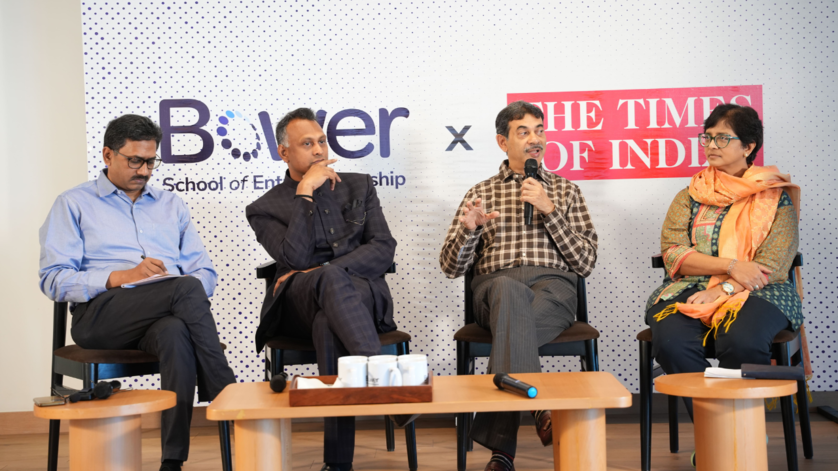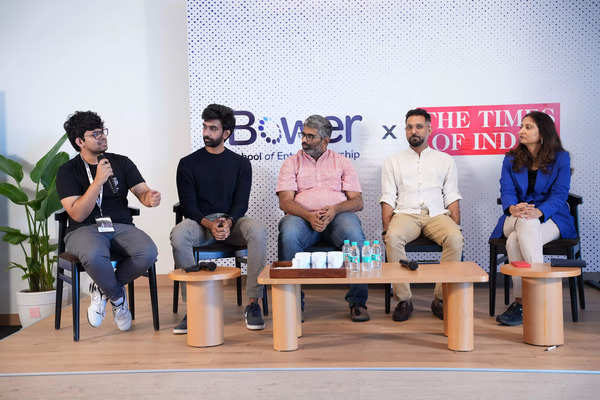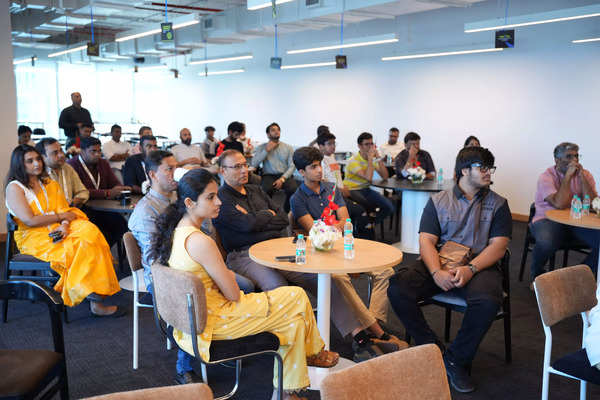The Times Conversations panel discussion, organised by The Times of India in collaboration with the Bower School of Entrepreneurship, provided an in-depth exploration of
Budget 2025
and its impact on startups and entrepreneurship. Eminent panellists shared their insights on how the government’s initiatives will shape the future of India’s startup ecosystem, making it more dynamic and globally competitive.
Budget 2025 – A positive step forward
Jayesh Ranjan, Special Chief Secretary of the Government of Telangana, emphasiszed the need to effectively implement policies to support innovation. He highlighted key budget initiatives like the Dhan-Dhaanya Krishi Yojana, which aims to boost agricultural productivity, and the Centers of Excellence (COEs) in AI, education, health, and sustainability. He also stressed the significance of the National Geospatial Mission, given Hyderabad’s status as a geospatial hub, and the importance of ensuring that programs like Atal Tinkering Labs and incubation centres function efficiently.
Kiran Chandra Kalluri agreed that the budget effectively outlines macro-objectives without delving into micro-details, allowing individuals and businesses the flexibility to leverage these goals in their own ways. He asserted that the long-term policy decisions outlined in the budget, such as the increase in the R&D budget and the creation of 50,000 Atal Tinkering labs, are crucial for fostering innovation from a young age.
Empowering persons with disabilities
Shanti Raghavan, Founder of Enable India, highlighted the significant potential of persons with disabilities in the workforce. She pointed out that 81% of persons with disabilities who are entrepreneurs or employed are supporting their families, with 56% being the sole breadwinners in urban areas. She emphasised the importance of recognising the contribution of disabled individuals and wished the budget had mentioned persons with disabilities upfront, not as a matter of sympathy, but as an opportunity for growth.
Systemic interventions for India’s future
Rajesh Dhuddu, Partner – Emerging Tech at PWC discussed India’s impressive contribution to the global workforce but stressed that systemic interventions are still lacking in foundational models such as supercomputers or quantum computing. He praised both the union and state governments’ public-private partnerships, stating that government intervention should act as a catalyst for ecosystem.
Pathway for youth
Jayesh Ranjan shared insights on the pathway for students and innovation, emphasising the need to balance quality with quantity. He pointed out the existing challenges with execution capacity and the need to partner with the nonprofit and private sectors to fill the gap. Ranjan stressed that innovation requires a specific set of skills that can’t simply be taught from a textbook and that the real task is in making the innovation pathway work.
A startup-centric budget
The Budget 2025 has been promising for startups, with a special emphasis on increased funding, revised tax benefits, and policies to encourage entrepreneurship.
Anuradha Acharya, CEO of MapMyGenome, emphasised that this year’s budget has delivered substantial relief for startups. “The research allocation has been quadrupled, signalling the government’s commitment to innovation,” she stated. She also pointed out the importance of preventive healthcare and how startups in the health-tech sector can contribute significantly with the right support.
Prasad Vanga, Founder & CEO of Anthill Ventures, described the budget as highly growth-oriented. He highlighted the increase in exemption limits for startups as a crucial step in fostering entrepreneurship. “Startups are long-term, high-risk capital ventures, and government support plays a crucial role in their success,” he noted.
A shift in the government’s approach
Rakesh Dubbudu, Founder of Factly, observed a significant shift in the government’s economic approach. “The new tax structure is a step forward, but timely implementation is key. The true success of these initiatives will be reflected in real-world outcomes,” he remarked.
Sandeep Bomireddy, Co-founder of AdOnMo, appreciated the pro-economy stance of the budget, which, according to him, will help Indian startups compete on a global scale. However, he pointed out that there is still scope for improvement in corporate taxation policies.
Empowering young entrepreneurs
Pawan Allena, Founder of Bower, emphasised the importance of initiatives aimed at young entrepreneurs. He highlighted the increase in funding for the Seed Fund Scheme, which has proven to be a game-changer for early-stage startups. “Providing financial support of Rs 25 to 50 lakh to emerging startups creates a more investor-friendly environment and helps young entrepreneurs take their first big leap,” he stated.
Challenges for Indian startups
Prasad Vanga highlighted that Indian startups often struggle to expand globally due to greater opportunities in markets like the US. He pointed out that raising funds in India is difficult because of complex procedures and approval requirements from SEBI and RBI. Vanga emphasised the need for the government to improve the ease of doing business globally to help startups reach a broader audience.
Pathway for incubation centres
Rakesh Dubbudu argued that merely setting up incubators is not sustainable. He proposed a hub-and-spoke model with focused government programs, such as school initiatives. He stressed that long-term maintenance and faculty management are bigger challenges than capital expenditure. Dubbudu suggested that well-established incubation centres in cities like Hyderabad could serve as anchor institutions to foster growth.
The role of patents in innovation
Anuradha Acharya shed light on the challenges of patent filing in India. She mentioned that startups often hesitate to file patents due to concerns about intellectual property protection. “The high costs associated with global patents and the difficulty in commercialiszing them pose significant hurdles for new businesses,” she explained. To foster meaningful innovation, she urged the government to focus on strengthening the patent ecosystem.
Conclusion
The panellists unanimously agreed that the budget effectively addresses the needs of the middle class and young entrepreneurs. They emphasiszed that the newly introduced and revised policies are set to boost the startup ecosystem, ultimately positioning India as a global leader in a variety of key sectors. The focus on long-term goals, increased funding, and tax revisions are crucial steps towards ensuring sustainable progress in the coming years.
https://bowerschool.com/
Disclaimer: The above content is non-editorial, and TIL hereby disclaims any and all warranties, expressed or implied, relating to the same. TIL does not guarantee, vouch for or necessarily endorse any of the above content, nor is it responsible for them in any manner whatsoever. The article does not constitute investment advice. Please take all steps necessary to ascertain that any information and content provided is correct, updated and verified.




